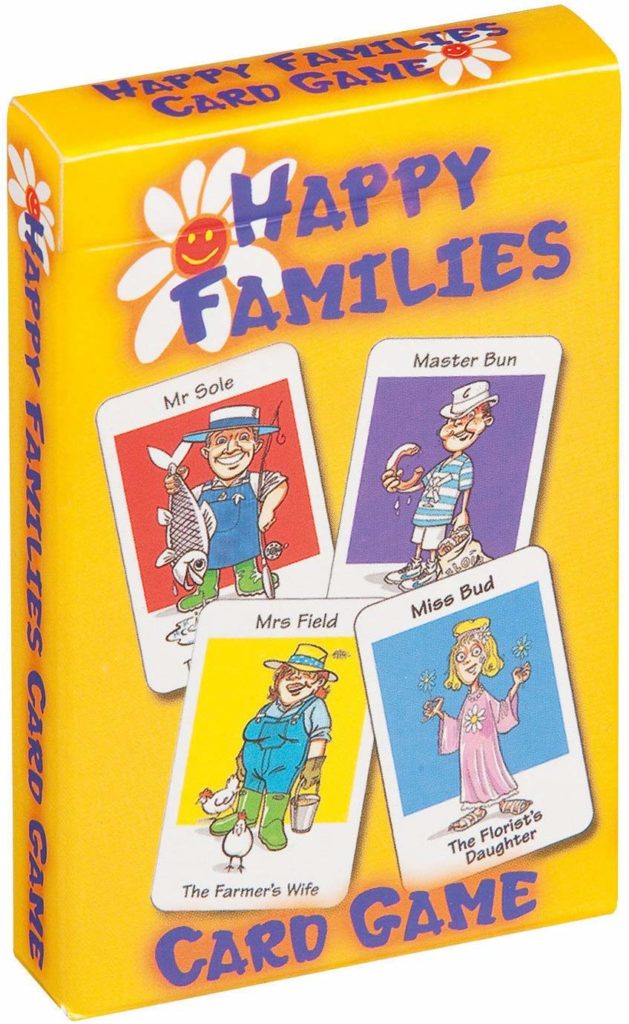In an arts and craft shop in Dublin, I spot a pack of Happy Families. It was one of our favourite games when the kids were small, but we either lost our pack during one of our many moves or it’s still in a box in my father’s attic.
I grab the pack of cards, hand over the five euro, and bring it home to play with my own happy family that evening.
I’ve always liked this game because it teaches kids some basic concepts of card-playing: how to sort your cards into groups, hold them up in a fan (if you can), win tricks, memorise who has what, keep a poker face. All good practice for getting stuck into the Gin Rummy and Poker later on, two games popular in my wider family.
My own mother grew up the youngest in a large family where they played a lot of cards. She passed on her love of playing, the subterfuge, raised eyebrows, the patience, and even, let’s be honest, of gambling. Up until recent years, St Stephens’s Day parties at my aunt’s house involved a poker game that was played in the good room once the younger cousins realised it was time to head to the room next door for the harmless (but naturally rowdier) bit of Pictionary.
I don’t remember playing Happy Families as a child. Maybe it was too tame for my mum, maybe I only hooked on to it when I became a parent myself, liking the name of it and its key concept.

To create a trick you need to gather all four members of each family – say, Mister Muck the Farmer, along with Mrs Muck, Master Muck and Miss Muck. From our own set even our daughters could tell how quaint the naming conventions were, how English, (who says Master?) and the names for the families: Cod, Hammer, Green.
The game was devised by London games maker John Jacques Jr in 1851 (who also invented Tiddlywinks, Ludo and Snakes & Ladders). But in truth the game hasn’t changed much over the years, and you can join in with collectors keen to get their hands on older versions. Around 2016, a British games company did create a new version of the game based around family types, rather than occupations. It was hardly modern, and still very English in tone – they tried to target a broader market with the Family with typical teenager, Family getting through Christmas, the Gross Cousins, Disastrous Family Barbecue.
At the opposite end of the scale, a friend once showed me a vintage version he had, a hilariously horrendous packet of Happy Families from the early 19th century. The families were actually nationalities, so the more hard-core stereotypes were right there. The warring Germans, carousing Italians, etc etc. The worst card in the pack, for me, was of course Mrs Paddy, the Irishman’s wife – an astonishing, but no-less-than-unusual caricature of a peasant Irish woman (with a 5 o’clock shadow): pig, pipe, stick and all.

This time round, playing with our new pack I was so happy to find in that local shop, it just wasn’t the same. It seems that we’ve all moved on and the kids, now a few years older, are much more tuned into the ways of the world, having lived in different places and seen so many societal changes, not least in Ireland. Not only did these new cards in our hands feel flimsier, the ideas are just more old-fashioned, with pictures that don’t fit with what they’re learning in school and from friends about modern identity.
Why does Miss Hose have a toy and her mother a pretty dress, if their father is the Fireman? Why is it still four family members of two genders?
We start to joke around –
“Do you have Barker Field, the farmer’s dog?”
“Or Ms Stamp the Postman’s civil partner”
“Or Dr Hammer the carpenter’s academic wife?”
“How about Mr Sheaf, the farmer’s husband?”
“Or the stepdaughter or adopted cousin or live-in boyfriend or ex-partner-coming-for-weekend-custody?”
Of course none of us did have any of those. But I was happy to see that the kids could acknowledge that this old-fashioned notion of the happy family didn’t sit right any more. And without even realising it, they’ve become citizens of a more open modern society.
Maybe we should design our own family card game…
All happy families are alike. Every unhappy family is unhappy in its own way.
Tolstoy, Anna Karenina
Brilliant!! Highly entertaining and informative! ??